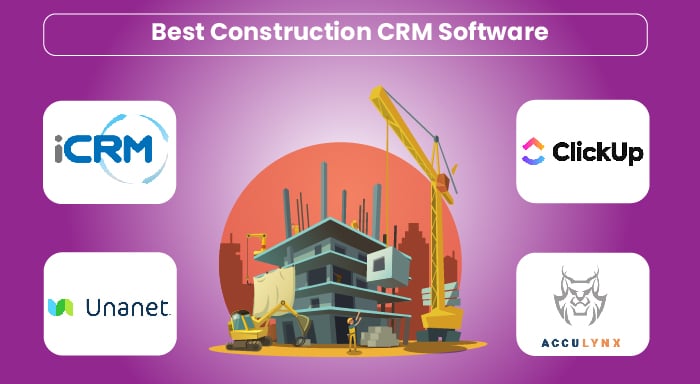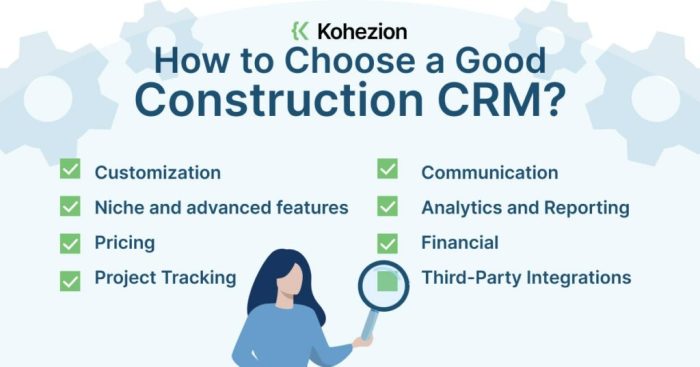The construction industry is dynamic, demanding, and often complex. Managing projects, clients, and teams effectively is crucial for success. This is where a robust Construction CRM (Customer Relationship Management) software steps in. A well-chosen CRM can streamline operations, improve communication, boost profitability, and ultimately, help you build a more successful business. This guide delves into the best construction CRM software options available, exploring their features, benefits, and considerations to help you make an informed decision.
Understanding the Need for Construction CRM Software
Traditional methods of managing construction projects often involve scattered spreadsheets, emails, and physical paperwork. This can lead to inefficiencies, miscommunication, missed deadlines, and ultimately, project delays and cost overruns. A dedicated construction CRM software centralizes all crucial information, providing a single source of truth for all stakeholders. This centralized approach improves collaboration, streamlines workflows, and enhances overall project management.
Key Benefits of Using Construction CRM Software:
- Improved Lead Management: Track leads from initial contact to project completion, ensuring no opportunity is missed.
- Enhanced Client Communication: Maintain consistent and transparent communication with clients through integrated communication tools.
- Streamlined Project Management: Manage tasks, deadlines, and resources efficiently, minimizing delays and cost overruns.
- Better Team Collaboration: Facilitate seamless collaboration among team members, subcontractors, and clients.
- Increased Productivity: Automate repetitive tasks, freeing up time for more strategic activities.
- Improved Reporting and Analytics: Gain valuable insights into project performance, client relationships, and overall business health.
- Enhanced Customer Satisfaction: Provide better service and support, leading to increased client satisfaction and loyalty.
Top Construction CRM Software Options: Best Construction Crm Software
The market offers a variety of construction CRM software solutions, each with its own strengths and weaknesses. Choosing the right one depends on your specific needs, budget, and business size. Here are some of the leading options:

Source: outrightcrm.com
1. CoConstruct, Best construction crm software
CoConstruct is a popular choice known for its user-friendly interface and comprehensive features specifically designed for the construction industry. It offers robust project management tools, client communication features, and reporting capabilities. Its strong focus on the construction industry sets it apart.
2. Buildertrend
Buildertrend is another leading CRM solution favored by many construction companies. It provides a centralized platform for managing projects, communicating with clients, and tracking progress. It’s particularly well-regarded for its intuitive design and powerful reporting features. Its mobile accessibility is a significant advantage for field teams.
3. HubSpot
While not exclusively designed for construction, HubSpot’s CRM is highly adaptable and offers a wide range of features that can be beneficial for construction businesses. Its scalability and integration capabilities make it a suitable option for growing companies. Its marketing automation features can be a significant asset.
4. Salesforce
Salesforce is a highly customizable and scalable CRM platform that can be tailored to meet the specific needs of construction businesses. Its extensive features and integration capabilities make it a powerful tool for large enterprises. However, its complexity might be overwhelming for smaller businesses.
5. Zoho CRM
Zoho CRM offers a cost-effective and feature-rich solution for businesses of all sizes. Its user-friendly interface and comprehensive features make it a popular choice among smaller construction companies. Its affordability is a key selling point.
Choosing the Right Construction CRM Software
Selecting the best construction CRM involves careful consideration of several factors:
Key Considerations:
- Budget: Determine your budget and explore pricing models (subscription-based, one-time purchase).
- Features: Identify the essential features you need, such as project management, client communication, reporting, and integration capabilities.
- Scalability: Choose a CRM that can grow with your business.
- User-Friendliness: Opt for a CRM with an intuitive interface that is easy for your team to learn and use.
- Integrations: Consider integrations with other software you use, such as accounting software, scheduling tools, and email marketing platforms.
- Customer Support: Ensure the vendor provides reliable customer support.
- Mobile Accessibility: Choose a CRM with a mobile app for on-the-go access.
Frequently Asked Questions (FAQ)
- Q: What is the cost of construction CRM software? A: The cost varies depending on the vendor, features, and number of users. Expect to pay a monthly or annual subscription fee.
- Q: How long does it take to implement a construction CRM? A: Implementation time depends on the complexity of the CRM and your business needs. It can range from a few weeks to several months.
- Q: Can a construction CRM integrate with other software? A: Yes, many construction CRMs offer integration capabilities with other software, such as accounting software, project management tools, and email marketing platforms.
- Q: What are the key features of a good construction CRM? A: Key features include project management, client communication, lead management, reporting, and mobile accessibility.
- Q: Is cloud-based CRM better than on-premise CRM for construction? A: Cloud-based CRMs are generally preferred for their accessibility, scalability, and cost-effectiveness. However, on-premise solutions might be considered for businesses with strict data security requirements.
- Q: How can I choose the right CRM for my construction business? A: Consider your budget, required features, scalability needs, user-friendliness, integration capabilities, and customer support when choosing a CRM.
Conclusion
Investing in the right construction CRM software is a strategic decision that can significantly impact your business’s success. By carefully evaluating your needs and considering the options discussed above, you can choose a solution that streamlines your operations, improves communication, and ultimately helps you build a more profitable and efficient construction business.
Call to Action
Ready to transform your construction business with a powerful CRM? Explore the options discussed in this guide and contact a vendor for a demo today! Start building a more efficient and profitable future.
Key Questions Answered
What are the key features to look for in construction CRM software?
Key features include project management tools, contact management, lead tracking, document management, reporting and analytics, and mobile accessibility.
How much does construction CRM software typically cost?
Pricing varies widely depending on the features, number of users, and vendor. Expect to see options ranging from affordable monthly subscriptions to more expensive enterprise solutions.
Can construction CRM software integrate with other business applications?
Many CRM solutions offer integration with accounting software, project management platforms, and other tools to create a unified workflow.
What is the learning curve for using construction CRM software?
The learning curve varies depending on the software’s user-friendliness and the complexity of your business processes. Many vendors offer training and support to ease the transition.
How can I ensure data security with a construction CRM?

Source: kohezion.com
Choose a vendor with robust security measures, including data encryption, access controls, and regular backups. Review their security policies and certifications.
